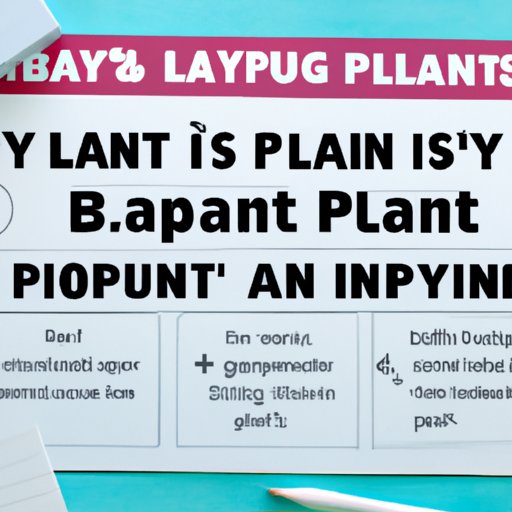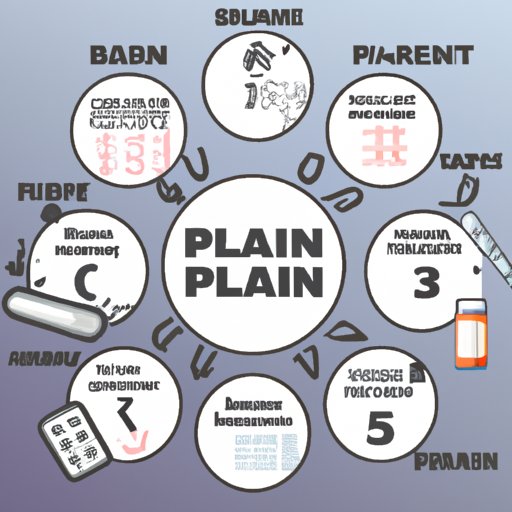Introduction
When discussing contraception options, emergency contraception (EC) is often a last-resort option to prevent pregnancy after unprotected sex. Plan B, one of the most common forms of EC, has been used for decades to help reduce the risk of unintended pregnancy. But how effective is Plan B, really? And how long does it work? This article will explore the science behind Plan B’s effectiveness, investigate the pros and cons of taking it, and unpack the myths around its duration of action.
Analyzing the Science Behind Plan B’s Effectiveness
Before delving into the specifics of how long Plan B works, it’s important to understand how it works in the first place. Plan B is a form of hormonal emergency contraception that contains levonorgestrel, a synthetic version of progesterone. It works by delaying or preventing ovulation and thus preventing fertilization. It does not cause an abortion, nor does it affect an existing pregnancy.
Clinical studies have shown that Plan B is highly effective when taken within 72 hours of unprotected intercourse, with one study finding that it was up to 95% effective when taken within 24 hours. However, its effectiveness decreases over time, with the same study finding that it was only 58% effective when taken between 48 and 72 hours after unprotected intercourse.

Exploring the Pros and Cons of Taking Plan B
Despite its efficacy, there are both pros and cons to taking Plan B. On the plus side, it can be taken quickly and easily without a prescription, and it is generally safe and well-tolerated. Additionally, it is a highly effective form of emergency contraception and can reduce the risk of unintended pregnancy.
On the other hand, Plan B may cause side effects such as nausea, vomiting, dizziness, abdominal pain, breast tenderness, and headaches. Additionally, it is not recommended for women who have a history of thromboembolic disease or those who are already pregnant. Lastly, it is worth noting that Plan B should not be used as a regular form of birth control, as it is less effective than other forms of contraception.
Examining the Impact of Time on How Long Plan B Works
As mentioned above, Plan B is most effective when taken within 72 hours of unprotected intercourse. However, there are several factors that can affect the duration of action of Plan B, including the amount of time since unprotected intercourse, the person’s weight, and the amount of levonorgestrel in the pill they take. Generally speaking, the sooner Plan B is taken, the more effective it is.
In terms of how long Plan B is effective after it is taken, most studies suggest that it is effective for up to five days. However, this does not mean that it is 100% effective for that entire period of time. Rather, its effectiveness decreases over time, with some studies suggesting that it is most effective within the first 24 hours after it is taken.

Investigating the Different Types of Emergency Contraception
Plan B is just one form of emergency contraception. Other types include Ella, an ulipristal acetate pill, and copper IUDs, which are intrauterine devices (IUDs) made of copper. Each type of EC has its own pros and cons, so it is important to talk to your healthcare provider about the best option for you.
For example, Ella is more effective than Plan B, but it requires a prescription and must be taken within 120 hours of unprotected intercourse. Copper IUDs, on the other hand, are highly effective and can be inserted up to five days after unprotected intercourse, but they require an office visit and involve a minor surgical procedure.
Comparing the Duration of Action for Different Forms of Emergency Contraception
When comparing the different types of EC, it is also important to consider their respective durations of action. Plan B is effective for up to five days, while Ella is effective for up to 120 hours. The copper IUD is the most effective form of EC, with studies showing that it is up to 99.9% effective at preventing pregnancy.
It is important to note that the effectiveness of all forms of EC decreases over time, so the sooner they are taken, the more effective they are likely to be. Additionally, none of these forms of EC protect against sexually transmitted infections (STIs). As such, it is important to use other forms of contraception, such as condoms, to help reduce the risk of contracting an STI.

Unpacking the Myths Around How Long Plan B Is Effective
There are many misconceptions and misunderstandings about Plan B and its effectiveness. For example, some people believe that Plan B is ineffective after 72 hours, when in fact, it is still effective up to five days after unprotected intercourse. Additionally, there is a common misconception that Plan B causes abortion, when in fact, it does not.
It is also important to note that Plan B is not a “morning after pill.” While it is commonly referred to as such, it is actually an emergency contraceptive that is most effective when taken as soon as possible after unprotected intercourse. Additionally, it is not recommended as a regular form of birth control, as it is less effective than other forms of contraception.
Conclusion
Plan B is a highly effective form of emergency contraception that is generally safe and well-tolerated. When taken within 72 hours of unprotected intercourse, it can reduce the risk of unintended pregnancy. However, its effectiveness decreases over time, and it is not recommended as a regular form of birth control due to its lower efficacy compared to other forms of contraception.
It is also important to note that there are many misconceptions and misunderstandings about Plan B and its effectiveness. Therefore, it is important to talk to your healthcare provider about the best form of contraception for you, as well as any potential risks or side effects associated with taking Plan B.
In conclusion, Plan B is an effective form of emergency contraception that can reduce the risk of unintended pregnancy when taken within 72 hours of unprotected intercourse. However, it is important to understand the pros and cons of taking it, as well as the myths and misconceptions surrounding its duration of action.
(Note: Is this article not meeting your expectations? Do you have knowledge or insights to share? Unlock new opportunities and expand your reach by joining our authors team. Click Registration to join us and share your expertise with our readers.)
